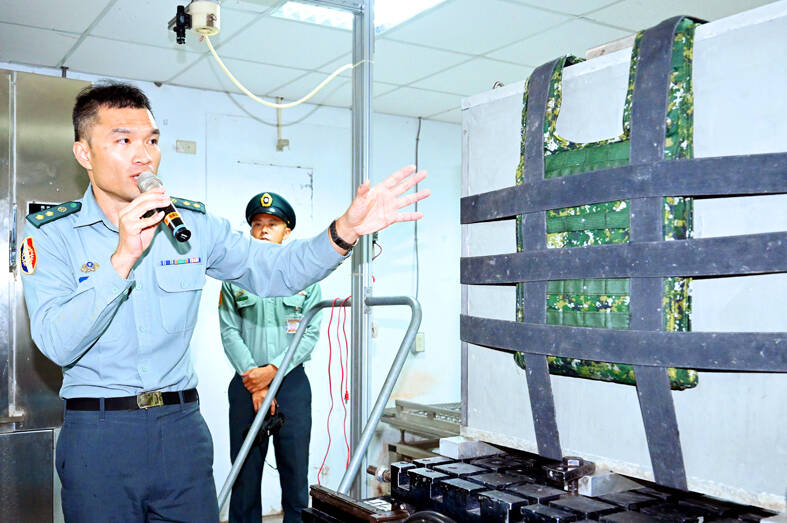The military plans to purchase 48,000 new boron carbide bullet-resistant ceramic plates, the Ministry of National Defense’s latest list of regulated military material showed.
Mass production of the plates is scheduled for between 2028 and 2029, according to the document that was released last week.
The plates are capable of protecting against up to 7.62mm armor-piercing ammunition or shrapnel.

Photo: Liao Chen-huei, Taipei Times
The budget is set at NT$840 million (US$28.08 million) for the 48,000 sets of plates in 2028 and 2029, the document showed, after an initial procurement of 30 units for NT$1.395 million.
The list does not indicate the plates’ protective rating, but the specifications for NIJ IV-level body armor — resisting a .30 caliber M2 armor-piercing round — are similar to that of the new armor.
Details on the protective rating, weight and which branches of the military are to adopt the armor are not yet public knowledge.
The current NIJ III-rated plates in use by the armed forces are designed to stop standard 7.62mm by 51mm NATO ammunition, the ministry said.
Armor plates that entered mass production this year have three layers of ceramic materials and polyethylene fibers, with 60,000 expected to be mass-produced and delivered to the military this year.
To protect against the 5.8mm steel-core rounds used by the Chinese People’s Liberation Army, as well as ordinary 7.62mm bullets, they were developed according to the Enhanced Small Arms Protective Insert specifications used by the US military, the ministry said.
The ministry in February signed a NT$1.6 billion contract to purchase 160,000 ceramic plates.
The ministry’s list of controlled materials includes both the body armor and the research used to develop them.
Boron carbide is among the hardest known materials, and is also lightweight, making it ideal for protective applications.
The export control military use list outlines items subject to export authorization due to their potential applications in national defense. Since 2021, the ministry has released the list annually in accordance with the National Defense Industry Development Act (國防產業發展條例).
Additional reporting by CNA

MAKING WAVES: China’s maritime militia could become a nontraditional threat in war, clogging up shipping lanes to prevent US or Japanese intervention, a report said About 1,900 Chinese ships flying flags of convenience and fishing vessels that participated in China’s military exercises around Taiwan last month and in January have been listed for monitoring, Coast Guard Administration (CGA) Deputy Director-General Hsieh Ching-chin (謝慶欽) said yesterday. Following amendments to the Commercial Port Act (商港法) and the Law of Ships (船舶法) last month, the CGA can designate possible berthing areas or deny ports of call for vessels suspected of loitering around areas where undersea cables can be accessed, Oceans Affairs Council Minister Kuan Bi-ling (管碧玲) said. The list of suspected ships, originally 300, had risen to about 1,900 as

Japan’s strategic alliance with the US would collapse if Tokyo were to turn away from a conflict in Taiwan, Japanese Prime Minister Sanae Takaichi said yesterday, but distanced herself from previous comments that suggested a possible military response in such an event. Takaichi expressed her latest views on a nationally broadcast TV program late on Monday, where an opposition party leader criticized her for igniting tensions with China with the earlier remarks. Ties between Japan and China have sunk to the worst level in years after Takaichi said in November that a hypothetical Chinese attack on Taiwan could bring about a Japanese

Right-wing political scientist Laura Fernandez on Sunday won Costa Rica’s presidential election by a landslide, after promising to crack down on rising violence linked to the cocaine trade. Fernandez’s nearest rival, economist Alvaro Ramos, conceded defeat as results showed the ruling party far exceeding the threshold of 40 percent needed to avoid a runoff. With 94 percent of polling stations counted, the political heir of outgoing Costa Rican President Rodrigo Chaves had captured 48.3 percent of the vote compared with Ramos’ 33.4 percent, the Supreme Electoral Tribunal said. As soon as the first results were announced, members of Fernandez’s Sovereign People’s Party

MORE RESPONSIBILITY: Draftees would be expected to fight alongside professional soldiers, likely requiring the transformation of some training brigades into combat units The armed forces are to start incorporating new conscripts into combined arms brigades this year to enhance combat readiness, the Executive Yuan’s latest policy report said. The new policy would affect Taiwanese men entering the military for their compulsory service, which was extended to one year under reforms by then-president Tsai Ing-wen (蔡英文) in 2022. The conscripts would be trained to operate machine guns, uncrewed aerial vehicles, anti-tank guided missile launchers and Stinger air defense systems, the report said, adding that the basic training would be lengthened to eight weeks. After basic training, conscripts would be sorted into infantry battalions that would take